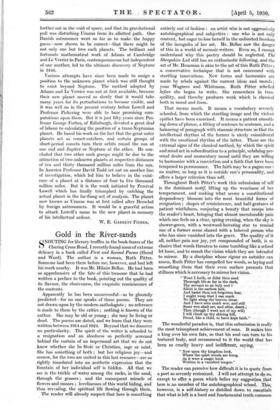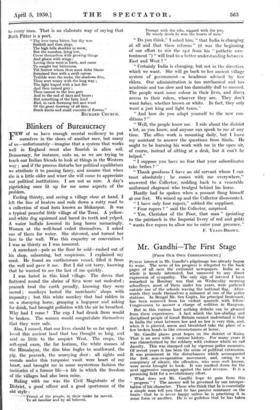Gold in the River-sands S NOUTING for literary truffles in the
book-boxes of the Charing Cross Road, I recentlyfound some of extreme delicacy in a book called First and Second Poems (Sheed and Ward). The author is a woman, Ruth Pitter. Someone had been there before me, however, and had left his mark nearby. It was Mr. Hilaire Belloc. He had been so apprehensive of the fate of this treasure that he had written a preface to the book, pointing out the quality of its flavour,, the elusiveness, the exquisite reminiscence of the contents.
Apparently he has been unsuccessful—as he gloomily predicted—for no one speaks of these poems. They are not drawn upon by the modern anthologists ; no reference is made to them by the critics ; nothing is known of the author. She may be old or young ; she may be living or dead. The poems are dated, and we learn that they were written between 1914 and 1924. Beyond that we discover no particularity. The spirit of the writer is schooled to a resignation and an aloofness so perfectly screened behind the curtain of an impersonal art that we do not know whether she be Stoic or Christian, sage or saint. She has something Of both ; but her religious joy—and sorrow, for the two are united in this last resource—are so rightly translated into an aesthetic expression that the fountain of her individual self is hidden. All that we see is the trickle of water among the rocks, in the sand, through the grasses ; and the consequent miracle of flowers and mosses.; lovelinesses of this world hiding, and thus revealing, the spiritual life flowing through" them.
The reader will already suspect that here is something entirely out of fashion : an artist who is not aggressively autobiographical and subjective : one who is not only content, but eager to lose herself in the unlimited freedom' of the incognito of her art. Mr. Belloc saw the danger of this in a world of memoir-writers. Even so, I cannot understand why this poetry should be neglected. The Shropshire Lad still has an enthusiastic following, and the art of Mr. Housman is akin to the art of this Ruth Pitter ; a conservative technique that is not concerned with startling innovations. New forms and harmonies are made by rebels 'against the current ideas and morals ; your Wagners and Whitman. Ruth Pitter rebelled before she began to write. She remembers in tran- quillity, and thereby produces work which is classical both in mood and form.
That means much. - It means a vocabulary severely schooled, from which the startling image and the violent epithet have been exorcised. It means a patient smooth- ing down of phrase, a fitting of sentence to sentence, and a balancing of paragraph' with stanzaic structure so that the intellectual rhythm of the former is nicely coincidental with the emotional rhythm of the latter. These are the external signs-Of the classical method, by which' the spirit and mind act in subordination to a principle, subduing per- sonal desire and momentary mood until they are willing to hannonize With aeonvictiOn and a faith-that have been tempered to permanence. The faith may be a: pagan one : no matter, so long as it is- outside one's personalifY, and offers a larger criterion than self.
Throughout Ruth Titter's work this submission of self is the dominant motif, lifting up the weariness of her temperament, and making what seems a constitutional. ciespOndency blossonf into the most beautiful forms of resignation'; shapes of reininiscence, and half-gestures' of patient wistfulness, conjuring a beauty that creeps' into' the reader's heart, bringing that almost Unendurable 'pain Which one feels on a clear, spring evening, when the sky is shoWer-green, with a westward-hovering star to remind one of a former scene shared with a beloved person WhO who has' since vanished into the grave. The quality of it all, neither pain nor ' joy, yet Compounded of both, is so elusive that words threaten to come tumbling like a school let loose, and to smash the vision which they are intended to mirror. By a discipline whose rigour no Outsider can assess, Ruth Pitter has compelled het words, so laying and smoothing them that their even surface presents that stillness which is' necessary to mirror her vision.
" Went I forth, or didst thou send Thorough life sb far in the dark, Thy servant to an holy end ? Silent is the earliest lark, And hadst thou not forgotten fear, I might weep that I can mark No light along the heaven drear. And I have seen much woe, and still
Some woe shall see, and after, death ;
Then (though I went not of iny will) I Will climb up thy shining Proud, like a child, to have kept faith."
The wonderful paradox is, that this submission is really the most triumphant achievement of man. It makes him a king over his own fate, so that his soul can turn to his tortured body, and recommend to it the world that has been so cruelly 'heavy and indifferent, saying, " Now upon thy kingdom look, Where the quiet woods are hung, As it were a magic book
Written in a vanished tongue."
The reader can perceive how difficult it is to quote: from a poet so severely restrained. I will not attempt to do so, except to offer a poem which belies my suggestion that here is no member of the autobiographical school. : This, however, is a self-history so distilled down to essentials that what is left is a hard and fundamental truth. common to every man. That is an elaborate way of saying that Ruth Pitter is apoet.
" Thy love turns bitter, but thy woe Smileth and then sings.
The high hills shudder in snow, But the marshes, lying low, Cover themselves with growing things And gleam with wings ; Loving thou went'st forth, and came To naught but bitterness, Till Sorrow whom thou most clidat blame Surprised thee with a swift caress.
Terrible were the rocks, the shadows dire, Thou wart weary with the long way ; The light leaped with a last fire And then turned grey ; Thou tamest to the iron gate And to the end of days and hours ; But something of the fairy kind Had, in each frowning fret and wind Of the great doorway of all fate, Stuck knots and small conceits of flowers."
RICHARD CHURCH.











































 Previous page
Previous page